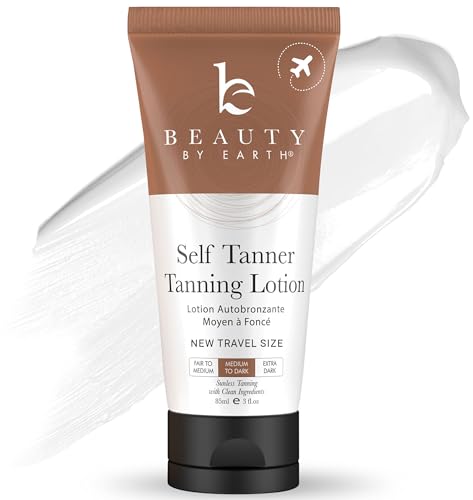

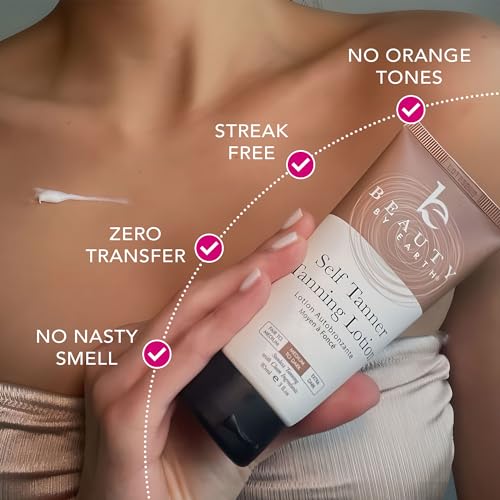
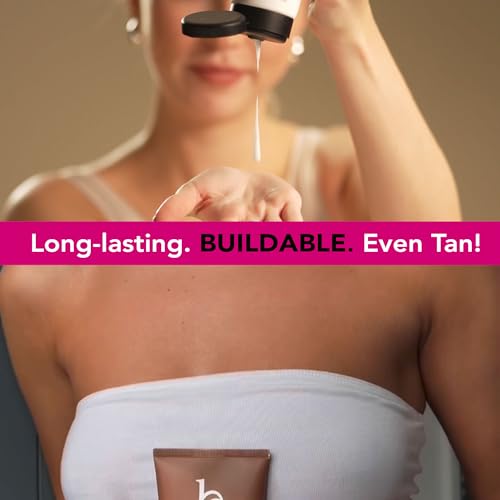
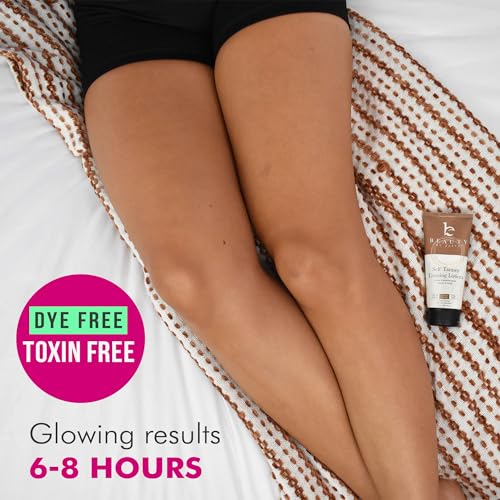
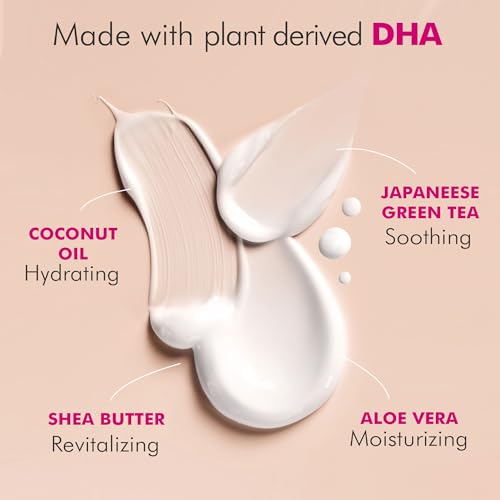
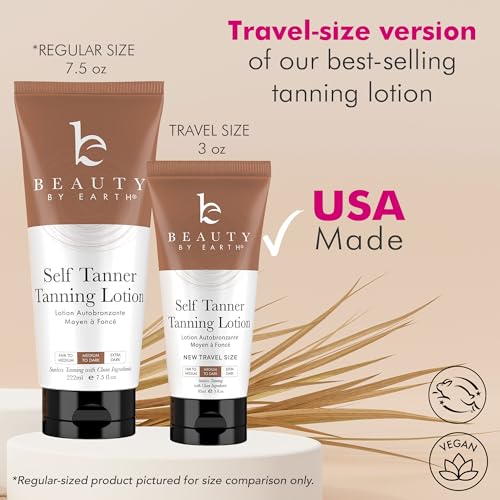
Natural Tanning Lotion - Gradual Color, Non-Toxic Ingredients, Travel Size - Medium to Dark


Dihydroxyacetone
High RiskDihydroxyacetone is an aliphatic ketone commonly used as a color additive in cosmetics, particularly in self-tanning products. It reacts with amino acids in the skin to produce a temporary brown color, mimicking a tan without exposure to UV radiation.
Sustai Insights
Dihydroxyacetone offers functional benefits as a skin-tanning agent without UV exposure, making it a safer alternative for achieving a bronzed appearance. However, it carries high use restrictions and is associated with low health risks such as irritation. Environmental concerns include its potential to contribute to pollution, while regulatory bodies may issue warnings regarding its use. Overall, the ingredient presents a high risk, necessitating careful consideration of usage practices and potential alternatives.
Camellia Sinensis (Green Tea) Leaf Extract
Medium RiskCamellia sinensis (green tea) leaf extract is derived from the leaves of the Camellia sinensis plant, primarily known for its antioxidant properties. It is commonly used in cosmetic formulations for its potential to soothe the skin and provide protective benefits against environmental stressors.
Sustai Insights
Camellia sinensis leaf extract offers functional benefits, including antioxidant properties that may protect the skin from damage and enhance product efficacy. While generally regarded as safe, it presents moderate allergenic potential and low concerns for carcinogenic or reproductive toxicity. Environmental risks are minimal; however, the sourcing practices should be evaluated for sustainability. Regulatory bodies do not impose significant restrictions, indicating a low-risk profile overall. Safe usage practices are advisable, and alternatives include other botanical extracts with similar benefits.
Hamamelis Virginiana (Witch Hazel) Distillate
Low RiskHamamelis virginiana (witch hazel) distillate is a plant-derived extract commonly used in cosmetic formulations for its astringent and soothing properties. It is primarily utilized for its ability to reduce inflammation and tighten skin, making it a popular ingredient in toners and aftershaves.
Sustai Insights
Witch hazel distillate exhibits several functional benefits, including its anti-inflammatory and astringent properties, which are beneficial for skin care. It is considered to have low health risks regarding carcinogenicity, allergies, and reproductive toxicity, with enhanced skin absorption being noted. Environmental concerns are minimal, as it is not classified as a pollutant or bioaccumulative. Regulatory bodies do not impose significant restrictions on its use. Overall, it is assessed as low risk, with recommendations for safe application in cosmetic products and consideration of alternatives like chamomile extract for similar benefits.
Cocos Nucifera (Coconut) Oil
Low RiskCocos Nucifera (Coconut) Oil is derived from the kernels of the coconut palm. It is primarily used in cosmetic formulations for its emollient and moisturizing properties, making it suitable for skin and hair care products.
Sustai Insights
Coconut oil serves as an effective moisturizer and emollient, promoting skin hydration and softness. It is sustainably sourced and biodegradable. Health risks are minimal, with low concerns regarding carcinogenicity, allergens, and reproductive toxicity. Environmental impact is also low, as it does not contribute significantly to pollution or bioaccumulation. Regulatory bodies have not issued restrictions on its use. Overall, coconut oil presents a low risk for health and environmental concerns, making it a safe ingredient in cosmetic products.
Argania Spinosa (Argan) Kernel Oil
Low RiskArgania spinosa (argan) kernel oil is a fixed oil extracted from the kernels of the argan tree, native to Morocco. It is commonly used in cosmetic formulations for its moisturizing properties, serving as an emollient and skin conditioner.
Sustai Insights
Argania spinosa kernel oil offers functional benefits such as effective hydration and nourishment for the skin and hair. It is sustainably sourced and biodegradable, contributing positively to environmental considerations. Health risks are low, with minimal concerns regarding carcinogenicity, allergies, or reproductive toxicity. There are no current regulatory restrictions on its use. Overall, it poses low risk, making it a suitable ingredient in cosmetic products. Safe usage practices should be maintained, and alternatives like jojoba oil may also be considered for similar benefits.
Vanilla Planifolia (Vanilla) Fruit Extract
Low RiskVanilla planifolia (vanilla) fruit extract is derived from the fruit of the vanilla plant. It is commonly used for its aromatic properties and as a flavoring agent in various products, including food, cosmetics, and personal care items.
Sustai Insights
Vanilla fruit extract offers functional benefits such as flavor enhancement and fragrance. It is sustainably sourced with low environmental impact and exhibits low risk for carcinogenicity and developmental toxicity. However, it may cause skin irritation in some individuals and has low to moderate allergenic potential. Regulatory bodies have not imposed significant restrictions, leading to an overall low risk assessment. Safe usage practices should be observed, and alternatives include synthetic vanillin for those seeking more stable options.
Simmondsia Chinensis (Jojoba)
Low RiskSimmondsia chinensis, commonly known as jojoba, is an oil derived from the seeds of the jojoba plant. It is commonly used in cosmetic formulations for its moisturizing properties, acting as an emollient and skin conditioning agent.
Sustai Insights
Jojoba oil offers functional benefits such as effective skin moisturization and is biodegradable, with sustainable sourcing practices. Health risks are low, with minimal concerns regarding carcinogenicity, allergies, and reproductive toxicity. Environmental impact is negligible, with no pollutant or bioaccumulation potential. Regulatory status is favorable with no significant restrictions noted. Overall, it is assessed as low risk, and safe usage practices should be maintained. Alternatives include other plant-derived oils like argan or almond oil, which may provide similar benefits.
Vaccinium Macrocarpon (Cranberry) Fruit
Low RiskVaccinium macrocarpon (cranberry) fruit is a natural ingredient derived from the cranberry plant, primarily used for its antioxidant properties and potential health benefits. It is commonly incorporated in dietary supplements and cosmetic products for skin hydration and protection.
Sustai Insights
Vaccinium macrocarpon exhibits functional benefits as an antioxidant and skin-conditioning agent. It is sustainably sourced and generally recognized as safe, with low concerns regarding carcinogenicity, allergies, and reproductive toxicity. While its environmental impact is minimal, it is not classified as a pollutant or bioaccumulative. Regulatory bodies have not issued significant warnings against its use. Overall, its risk level is low, making it a safe choice in various applications. Safe usage practices should be followed, and alternatives are limited due to its unique properties.
Water
Low RiskWater is a clear, colorless liquid essential for various biological processes. It serves as a solvent in formulations, facilitating the dissolution of other ingredients and enhancing product texture and application. Additionally, water plays a crucial role in hydration and is a key component in many cosmetic and personal care products.
Sustai Insights
Water is an effective solvent and hydrator, contributing to the texture and efficacy of formulations. It is biodegradable and generally regarded as safe, with low concerns regarding carcinogenicity, allergies, and reproductive toxicity. However, excessive water usage can lead to environmental concerns, particularly regarding resource depletion. Regulatory bodies do not impose restrictions on water use in cosmetics. Overall, the risks associated with water are low, making it a safe and essential ingredient.
Cetyl Alcohol
Low RiskCetyl alcohol is a long-chain organic alcohol commonly used in cosmetic formulations. It serves as an emollient, emulsifier, and thickening agent, enhancing the texture and stability of products. Cetyl alcohol is derived from natural sources, such as coconut or palm oil, and is often included in creams, lotions, and hair conditioners.
Sustai Insights
Cetyl alcohol offers functional benefits as an emollient and emulsifier, improving product texture and stability. It is biodegradable and sourced from renewable materials, contributing to sustainability. Health risks are minimal, with low concerns for carcinogenicity, allergies, or reproductive toxicity. Environmental impact is also low, with no significant pollutant or bioaccumulation potential. Regulatory bodies have not placed restrictions on its use, indicating a favorable safety profile. Overall, cetyl alcohol is assessed as low risk, and safe usage practices include ensuring proper formulation concentrations.
Stearyl Alcohol
Low RiskStearyl alcohol is a compound produced from the hydrogenation of stearic acid, commonly used in cosmetic formulations as an emulsifier and thickening agent. It helps stabilize products by blending oil and water phases, enhancing texture and consistency.
Sustai Insights
Stearyl alcohol provides functional benefits as an emulsifier and stabilizer, contributing to improved product texture. It is generally regarded as safe with low concerns for cancer, allergies, and reproductive toxicity. However, it may cause moderate skin, eye, or respiratory irritation. Regulatory bodies do not impose significant restrictions, indicating a low overall risk. While it poses minimal health and environmental hazards, caution is advised for sensitive individuals. Alternatives like cetyl alcohol or plant-based emulsifiers may offer safer options for formulators.
Camellia Sinensis (Green Tea) Leaf Extract
Medium RiskCamellia sinensis (green tea) leaf extract is derived from the leaves of the Camellia sinensis plant, primarily known for its antioxidant properties. It is commonly used in cosmetic formulations for its potential to soothe the skin and provide protective benefits against environmental stressors.
Sustai Insights
Camellia sinensis leaf extract offers functional benefits, including antioxidant properties that may protect the skin from damage and enhance product efficacy. While generally regarded as safe, it presents moderate allergenic potential and low concerns for carcinogenic or reproductive toxicity. Environmental risks are minimal; however, the sourcing practices should be evaluated for sustainability. Regulatory bodies do not impose significant restrictions, indicating a low-risk profile overall. Safe usage practices are advisable, and alternatives include other botanical extracts with similar benefits.
Hamamelis Virginiana (Witch Hazel) Distillate
Low RiskHamamelis virginiana (witch hazel) distillate is a plant-derived extract commonly used in cosmetic formulations for its astringent and soothing properties. It is primarily utilized for its ability to reduce inflammation and tighten skin, making it a popular ingredient in toners and aftershaves.
Sustai Insights
Witch hazel distillate exhibits several functional benefits, including its anti-inflammatory and astringent properties, which are beneficial for skin care. It is considered to have low health risks regarding carcinogenicity, allergies, and reproductive toxicity, with enhanced skin absorption being noted. Environmental concerns are minimal, as it is not classified as a pollutant or bioaccumulative. Regulatory bodies do not impose significant restrictions on its use. Overall, it is assessed as low risk, with recommendations for safe application in cosmetic products and consideration of alternatives like chamomile extract for similar benefits.
Dihydroxyacetone
High RiskDihydroxyacetone is an aliphatic ketone commonly used as a color additive in cosmetics, particularly in self-tanning products. It reacts with amino acids in the skin to produce a temporary brown color, mimicking a tan without exposure to UV radiation.
Sustai Insights
Dihydroxyacetone offers functional benefits as a skin-tanning agent without UV exposure, making it a safer alternative for achieving a bronzed appearance. However, it carries high use restrictions and is associated with low health risks such as irritation. Environmental concerns include its potential to contribute to pollution, while regulatory bodies may issue warnings regarding its use. Overall, the ingredient presents a high risk, necessitating careful consideration of usage practices and potential alternatives.
Cocos Nucifera (Coconut) Oil
Low RiskCocos Nucifera (Coconut) Oil is derived from the kernels of the coconut palm. It is primarily used in cosmetic formulations for its emollient and moisturizing properties, making it suitable for skin and hair care products.
Sustai Insights
Coconut oil serves as an effective moisturizer and emollient, promoting skin hydration and softness. It is sustainably sourced and biodegradable. Health risks are minimal, with low concerns regarding carcinogenicity, allergens, and reproductive toxicity. Environmental impact is also low, as it does not contribute significantly to pollution or bioaccumulation. Regulatory bodies have not issued restrictions on its use. Overall, coconut oil presents a low risk for health and environmental concerns, making it a safe ingredient in cosmetic products.
Argania Spinosa (Argan) Kernel Oil
Low RiskArgania spinosa (argan) kernel oil is a fixed oil extracted from the kernels of the argan tree, native to Morocco. It is commonly used in cosmetic formulations for its moisturizing properties, serving as an emollient and skin conditioner.
Sustai Insights
Argania spinosa kernel oil offers functional benefits such as effective hydration and nourishment for the skin and hair. It is sustainably sourced and biodegradable, contributing positively to environmental considerations. Health risks are low, with minimal concerns regarding carcinogenicity, allergies, or reproductive toxicity. There are no current regulatory restrictions on its use. Overall, it poses low risk, making it a suitable ingredient in cosmetic products. Safe usage practices should be maintained, and alternatives like jojoba oil may also be considered for similar benefits.
Vanilla Planifolia (Vanilla) Fruit Extract
Low RiskVanilla planifolia (vanilla) fruit extract is derived from the fruit of the vanilla plant. It is commonly used for its aromatic properties and as a flavoring agent in various products, including food, cosmetics, and personal care items.
Sustai Insights
Vanilla fruit extract offers functional benefits such as flavor enhancement and fragrance. It is sustainably sourced with low environmental impact and exhibits low risk for carcinogenicity and developmental toxicity. However, it may cause skin irritation in some individuals and has low to moderate allergenic potential. Regulatory bodies have not imposed significant restrictions, leading to an overall low risk assessment. Safe usage practices should be observed, and alternatives include synthetic vanillin for those seeking more stable options.
Simmondsia Chinensis (Jojoba)
Low RiskSimmondsia chinensis, commonly known as jojoba, is an oil derived from the seeds of the jojoba plant. It is commonly used in cosmetic formulations for its moisturizing properties, acting as an emollient and skin conditioning agent.
Sustai Insights
Jojoba oil offers functional benefits such as effective skin moisturization and is biodegradable, with sustainable sourcing practices. Health risks are low, with minimal concerns regarding carcinogenicity, allergies, and reproductive toxicity. Environmental impact is negligible, with no pollutant or bioaccumulation potential. Regulatory status is favorable with no significant restrictions noted. Overall, it is assessed as low risk, and safe usage practices should be maintained. Alternatives include other plant-derived oils like argan or almond oil, which may provide similar benefits.
Vaccinium Macrocarpon (Cranberry) Fruit
Low RiskVaccinium macrocarpon (cranberry) fruit is a natural ingredient derived from the cranberry plant, primarily used for its antioxidant properties and potential health benefits. It is commonly incorporated in dietary supplements and cosmetic products for skin hydration and protection.
Sustai Insights
Vaccinium macrocarpon exhibits functional benefits as an antioxidant and skin-conditioning agent. It is sustainably sourced and generally recognized as safe, with low concerns regarding carcinogenicity, allergies, and reproductive toxicity. While its environmental impact is minimal, it is not classified as a pollutant or bioaccumulative. Regulatory bodies have not issued significant warnings against its use. Overall, its risk level is low, making it a safe choice in various applications. Safe usage practices should be followed, and alternatives are limited due to its unique properties.
Water
Low RiskWater is a clear, colorless liquid essential for various biological processes. It serves as a solvent in formulations, facilitating the dissolution of other ingredients and enhancing product texture and application. Additionally, water plays a crucial role in hydration and is a key component in many cosmetic and personal care products.
Sustai Insights
Water is an effective solvent and hydrator, contributing to the texture and efficacy of formulations. It is biodegradable and generally regarded as safe, with low concerns regarding carcinogenicity, allergies, and reproductive toxicity. However, excessive water usage can lead to environmental concerns, particularly regarding resource depletion. Regulatory bodies do not impose restrictions on water use in cosmetics. Overall, the risks associated with water are low, making it a safe and essential ingredient.
Cetyl Alcohol
Low RiskCetyl alcohol is a long-chain organic alcohol commonly used in cosmetic formulations. It serves as an emollient, emulsifier, and thickening agent, enhancing the texture and stability of products. Cetyl alcohol is derived from natural sources, such as coconut or palm oil, and is often included in creams, lotions, and hair conditioners.
Sustai Insights
Cetyl alcohol offers functional benefits as an emollient and emulsifier, improving product texture and stability. It is biodegradable and sourced from renewable materials, contributing to sustainability. Health risks are minimal, with low concerns for carcinogenicity, allergies, or reproductive toxicity. Environmental impact is also low, with no significant pollutant or bioaccumulation potential. Regulatory bodies have not placed restrictions on its use, indicating a favorable safety profile. Overall, cetyl alcohol is assessed as low risk, and safe usage practices include ensuring proper formulation concentrations.
Stearyl Alcohol
Low RiskStearyl alcohol is a compound produced from the hydrogenation of stearic acid, commonly used in cosmetic formulations as an emulsifier and thickening agent. It helps stabilize products by blending oil and water phases, enhancing texture and consistency.
Sustai Insights
Stearyl alcohol provides functional benefits as an emulsifier and stabilizer, contributing to improved product texture. It is generally regarded as safe with low concerns for cancer, allergies, and reproductive toxicity. However, it may cause moderate skin, eye, or respiratory irritation. Regulatory bodies do not impose significant restrictions, indicating a low overall risk. While it poses minimal health and environmental hazards, caution is advised for sensitive individuals. Alternatives like cetyl alcohol or plant-based emulsifiers may offer safer options for formulators.
Experience a sun-kissed glow without the sun's harmful rays with our Tanning Lotion Self Tanner. This travel-sized, non-toxic formula is crafted with natural and organic ingredients, making it the perfect choice for health-conscious consumers seeking a radiant tan without compromise.
- Natural-Looking Tan: Achieve a beautiful sun-kissed glow with our gradual tanning lotion, available in fair to medium and medium to dark shades, suitable for all skin types.
- Easy, Streak-Free Application: Enjoy a smooth, non-sticky application that guarantees a flawless, streak-free finish every time, perfect for on-the-go tanning.
- Quick Results: Our self-tanner absorbs quickly, delivering a natural bronzed color in just a few hours, so you can glow effortlessly.
- Safe and Gentle: Made with organic ingredients like aloe vera and shea butter, this lotion is dye-free and toxin-free, ensuring a safe tanning experience for your skin.
- Mess-Free Tanning: Our clean formula provides a stunning tan without staining clothes or sheets, allowing you to enjoy your glow worry-free.
Proudly made in the USA, this self tanner is a trusted choice for consumers who value quality and ethical practices.
Subscribe & Save with Sustai
- Best Price Guarantee: Always enjoy the lowest prices on sustainable home essentials.
- No Surprises: We’ll notify you before shipping. No hidden fees, ever.
- You’re in Charge: Change, pause, or cancel your subscription anytime with ease.
- Eco-Friendly Deliveries: Our grouped shipments mean less packaging and lower emissions.
Join us on a sustainable journey. Special offers for a limited time! Prices and promotions may change.
Recommended Products
Experience a sun-kissed glow without the sun's harmful rays with our Tanning Lotion Self Tanner. This travel-sized, non-toxic formula is crafted with natural and organic ingredients, making it the perfect choice for health-conscious consumers seeking a radiant tan without compromise.
- Natural-Looking Tan: Achieve a beautiful sun-kissed glow with our gradual tanning lotion, available in fair to medium and medium to dark shades, suitable for all skin types.
- Easy, Streak-Free Application: Enjoy a smooth, non-sticky application that guarantees a flawless, streak-free finish every time, perfect for on-the-go tanning.
- Quick Results: Our self-tanner absorbs quickly, delivering a natural bronzed color in just a few hours, so you can glow effortlessly.
- Safe and Gentle: Made with organic ingredients like aloe vera and shea butter, this lotion is dye-free and toxin-free, ensuring a safe tanning experience for your skin.
- Mess-Free Tanning: Our clean formula provides a stunning tan without staining clothes or sheets, allowing you to enjoy your glow worry-free.
Proudly made in the USA, this self tanner is a trusted choice for consumers who value quality and ethical practices.

You can have at most 2 Sustainable Steals products in your cart
Customer Reviews
Customers’ View
Customers generally appreciate the effectiveness and natural formulation of Beauty by Earth's Self Tanner Lotion. Many users highlight the product's quick drying time and streak-free application, with one reviewer noting it delivers a 'natural look and clean ingredients.' The compact travel size is also praised for convenience, making it easy to maintain a sun-kissed glow on the go. While the majority find the scent acceptable, some customers mention it can be strong, suggesting using the product before bed for the best experience. Overall, the self-tanner is recognized for its non-toxic ingredients, aligning with the values of health-conscious consumers who seek safe and effective alternatives for achieving a bronzed complexion.
AI-generated from the text of customer reviewsThis product has no reviews yet.





